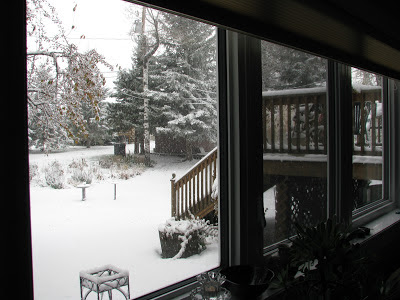 |
| Aaaahhh, autumn |
 |
| What a difference a day makes, 24 little hours . . . |
From CBC News online:
“Two convicted
criminals, one of them still serving time, have been awarded Queen's Diamond
Jubilee medals by a Conservative MP.”
The Conservative MP awarding these medals was my MP,
Maurice Vellacott, representing the constituency of Saskatoon-Wanuskewin. The
two “criminals” referred to are anti-abortionist activists Mary Wagner and
Linda Gibbons, both of whom have been convicted over the years for disobeying
restraining orders prohibiting them from demonstrating at and/or interfering
with the normal activities at abortion clinics.
I didn't know about these medals, nor that MPs each had
the privilege of recommending 30 people to receive them. Vellacott's choice has
been questioned by the opposition and others inasmuch as the two recipients
have demonstrated contempt for the law which MPs are expected to uphold.
Vellacott's defence was also reported in the article:
“Unlike the justice minister, Vellacott was unable to
award these medals to the victims of crime, because these baby victims are
dead, so instead the award to those 'heroines of humanity' Mary Wagner and
Linda Gibbons who are trying to protect defenceless, voiceless human beings in
the womb from butchery and death, and trying to let vulnerable women know that
there are other options and support and adoption possibilities,” Vellacott said
in his statement: “It's what you would expect in a caring, compassionate
society.”
Vellacott continued, “It's a pretty upside down world
when we honour abortionists like Henry Morgentaler for killing over 5,000
babies and imprison precious women, like Mary Wagner and Linda Gibbons, who try
to save babies from such savagery. They are the real heroes of humanity!”
I'd be the last to condemn the women for exercising civil
disobedience in support of their strongly-held beliefs. Their courage,
considering the consequences to themselves, seems clear whether you agree with
their stand or not.
Vellacott's actions in awarding them the Queen's Diamond
Jubilee medal, however, shows a lack of judgement many of his constituents
recognize as being consistent with a chain of missteps. Vellacott needs to
decide whether he represents his constituents or a few ideological hot buttons. I know
the distinction isn't clear-cut, but the laws regarding abortion must either be
upheld or changed by the orderly processes of parliament and the recent
rejection by that body of any revival of debate on “when life begins” seems not
to have taught Vellacott anything.
And then there's the language: savagery, killing,
butchery in relation to abortion are words that suggest the speaker has
lost his objectivity, an objectivity constituents have a right to expect from
their representative in Ottawa.
But then, “orderly processes of democracy” is something
the current government doesn't seem to be concerned about: omnibus bills,
proroguing parliament to avoid difficulties, announcing controversial decisions
at two minutes to midnight, the list goes on and on by now. If Vellacott acts
without an understanding of how democracy ought to function and what the role
of an MP is in a democratic state, he's in good company with Stephen Harper,
Vic Toews, Bev Oda, Peter McKay, John Baird and the rest, all of whom have
demonstrated their contempt for parliamentary debate at various times.
The awarding of a few Queen's Diamond Jubilee medals is
not a big thing, and maybe I'm just piqued because I didn't get one. The
behaviour of MPs in a democracy is a big thing, however, and I wish my
fellow constituents would hold Maurice Vellacott's feet to the fire more often
than they do.
There's no point in my doing so; he won't acknowledge my
messages anymore.



